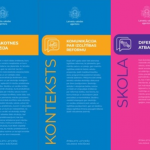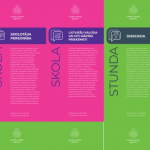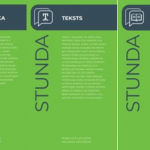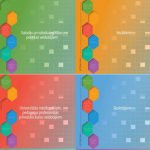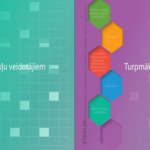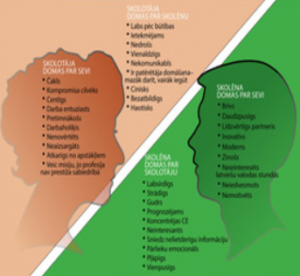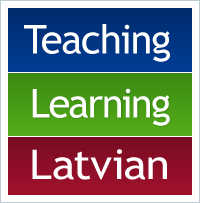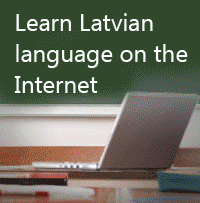Researches
One of the tasks of Latvian Language Agency is to analyse the situation of the state language and dynamics of sociolinguistic processes in Latvia.
The research of state language situation is conducted in accordance with the Guidelines of the State Language Policy and the State Language Policy Programme.
The aim of the sociolinguistic study is to identify the trends in language situation in Latvia, and to strengthen the importance of Latvian language among the official languages of the European Union, as well as to promote and shape the public opinion of Latvian as the language of national self-confidence and the basis of Latvia’s statehood.
Study “The Linguistic Situation in Latvia: 2016–2020”
The study “The Linguistic Situation in Latvia: 2016–2020” is the next stage of a regular linguistic study conducted by the Latvian Language Agency. The study is carried out as part of the 2nd sub-project “Sociolinguistics” of the state research program “Latvian Language” (No. VPP-IZM-2018/2-0002) (Activity No. 2 “The Development of Linguistic Monitoring (2016–2020)).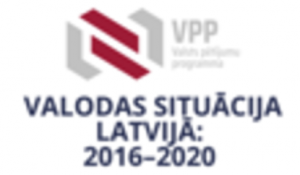
The study will be published in 2021 and is currently in its data processing and analysis stage.
Currently we encourage you to take a look at the infographics prepared by our researchers, depicting the results of the study. They will be updated and published on our website in the future.
If you want to repost the infographics and the information published on our website, a reference to the Latvian Language Agency is mandatory.
The study “The attitude towards the Latvian language and its acquisition process”
(2017 – 2020)
The aim of this study was to find out the attitude of teachers and students towards the process of learning the Latvian language – how it is and should be done, what hinders and what promotes learning Latvian. To answer these and other questions, it was important to identify the factors that make one’s attitude positive or negative. The data in the study was obtained in these three ways:
- by surveying 333 8th to 12th grade students and 65 Latvian language teachers,
- by holding eight focus group interviews in Riga, Daugavpils, Rezekne and Liepaja,
- by observing the process of 46 lessons in Riga, Salaspils, Daugavpils, Rezekne, Liepaja, Valmiera and Jelgava.
The research group was led by dr. Philol. Sanita Lazdiņa; Dr.philol. Gunta Kļava, Dr. philol. Solvita Pošeiko, mag. paed. Vineta Vaivade. Dr. sc.soc. Miķelis Grīviņš participated in the preparation work, implementation of and the data processing throughout the entire study. Baldone Secondary School Latvian language teacher Dzintra Knohenfelde participated in some parts of the research.
Dr. paed Diāna Laiveniece, Dr. paed. Elita Stikute, Dr. philol. Inita Vītola, as well as Rēzekne’s Academy of Technology students Laine Riekstiņa, Amanda Dzērvīte, Diāna Žilinska-Ivanova and Liepāja’s Secondary School No. 15 teacher Agnese Laškova participated in the lesson observation work alongside a group of researchers.
The lesson observers observed and studied a total of 46 lessons at Rēzekne State Gymnasium (teacher I. Gailīte), Daugavpils 9th Secondary School (teachers A. Jurģīte and I. Sardiko), Daugavpils State Gymnasium (teachers I. Žukovska and I. Kondratjeva), Zolitūde Gymnasium (teacher I. Hitrova), Salaspils Secondary School No. 1 (teacher L. Pamiljane), Salaspils Secondary School No. 2 (teacher B. Asare), Valmiera Viestura Secondary School (teacher I. Lancmane), Valmiera Pārgauja State Gymnasium (teacher A Ignate), Jelgava Spidola Gymnasium (teacher A. Latiša), Liepāja State 1st Gymnasium (V. Braša).
We extend our gratitude towards everyone who participated in the research and hope that our research will help current and future teachers, and other individuals associated with the teaching of the Latvian language by providing them with new ideas and suggestions.
The results of the study are summarized in 15 booklets in accordance with the directions of the research.
Suggestions
The research (especially the focus group discussions) paints a picture of the contemporary student and teacher, and how they
perceive themselves, namely:
– what teachers have said about themselves, their work and feelings when teaching the Latvian language;
– how teachers are perceived and described by students;
– what the students say about themselves, their feelings and attitude towards learning the Latvian language;
– how the students are perceived and described by teachers.
Text
The informational video “Text” reveals how it is possible to integrate texts from the students’ surrounding environment into their learning process and how to develop students’ literacy. The focus is on one health-related advertisement that can be used when creating a series of tasks on vivid figured of speech, verbal and non-verbal information, and the impact of advertising on society.
Here’s the informational video.
Discussion
The informational video “Discussion” explores how planning and organizing discussions should be done and focuses particularly on three aspects: independent high school students’ work individually, in pairs and in groups; how to provide information prior to a discussion; the latest sociolinguistic research in Latvia. The developed set of texts and tasks is intended for the highest level of secondary school language learning, but the structure of the discussion can also be useful for the optimal level of language acquisition in secondary school or primary school.
Here’s the informational video.
A pupil’s personality
The informational video “A pupil’s personality” explores the conclusions of the study “Attitude towards the Latvian Language and its Learning Process” on the importance of getting to know a pupil’s personality and the need to create a positive teacher-student relationship. The pupils wished for a free learning environment and atmosphere, because this would make them and the teachers feel much better at school. They also encouraged teachers to perceive them as equal partners, to listen to their thoughts and ideas, and to create a meaningful learning environment in which pupils understand why and what they are doing.
Here’s the informational video.
Latvian language and other subjects
The informational video “Latvian language and other subjects” explores the conclusions of the study “The Attitude towards the Latvian Language and its Learning Process” – that modern schools should teach holistically, integrating the content and skills of different subjects. Language has great potential in this regard since it is not only a subject with its own content, but also a tool for learning other subjects. The ability of teachers to combine the content of several subjects will help students to acquire the necessary knowledge and appreciate the interconnectedness and necessity of all subjects outside the school too, as well as give students what they desire the most – an interesting lesson.
Here’s the informational video.
A personalized approach
The informational video “The Individualization and Differentiation of the Learning Process” openly reflects on personalized teaching and learning. Every child, every student has a unique personality; our needs and opportunities, our interests and abilities are all different. Therefore, the learning process also needs to become more personalized. It is a matter of understanding, attitude, and support.
Here’s the informational video.
Grammar and methodology
The informational video “Grammar and Methodology” provides suggestions on teaching grammar. Based on one example of word formation and neologisms, the following important questions were identified with the help of specific tasks: how to plan work so that students learn to recognize, study and discover grammar instead of being taught and instructed by the teacher; how to help students see that grammar is not just something abstract, but it is all around them; how to include familiar, modern, environmental and virtual contexts in the teaching of grammar; how can the Latvian language corpus help teachers and students find diverse and modern examples, thereby creating a better understanding of the subject.
Here’s the informational video.
Vocabulary
The informational video “Vocabulary” presents a problem arising from research data – when teaching Latvian, too little attention is paid to increasing the students’ vocabulary. By working purposefully with a variety of techniques aimed at identifying keywords and other text-reading strategies, students are encouraged to use lesser-used words, thus expanding their active vocabulary. Using the example of one specific text (a critical review of the film “Astrid Lindgren’s Youth”), the video shares ideas on how to work with keyword identification in the classroom.
Here’s the informational video.
A vision of education
The informational video “A vision of education” summarizes the recommendations produced in the study “The Attitude towards the Latvian Language and its Learning Process” and explores how teachers should talk about the need to learn the Latvian language. It is easier to teach knowledge whose value is not disputed and whose use does not need to be justified. However, this is not always the case with the Latvian language – international opportunities and the internationalization of the surrounding environment may make students, their parents and even teachers question the significance of this subject. This video provides brief suggestions on how teachers can talk to students about the importance of learning Latvian.
Here’s the informational video.
Emotions in the classroom
The informational video “Emotions in the Classroom” explores the findings of a study on how extracurricular experiences enter the classroom. Data shows that studies cannot be detached from everyday experience and that extracurricular activities will always find their way into the classroom. Both students and teachers report that for the learning process to be successful and enjoyable, teachers must be able to assess the impact of extracurricular events and emotions on the lesson and to learn to manage these outside factors professionally. To better manage emotions in the classroom, clear rules need to be established for how extracurricular experiences can be integrated into class.
Here’s the informational video.
The Personality of Teachers
The informational video “The Personality of Teachers” summarizes the conclusions of the study “The Attitude towards the Latvian Language and its Learning Process” on the impact of a teacher’s personality on the learning process. The study illustrates how good results in education are not just about a teacher’s professional training, but also about their personality. It affects the students’ emotional connection with their teachers, school and the learning process and can change the students’ attitude towards learning.
Here’s the informational video.
Diverse Methods for learning the Latvian Language
The informational video “Diverse Methods for learning the Latvian Language” provides ideas for various Latvian language acquisition methods.
Here’s the informational video.

